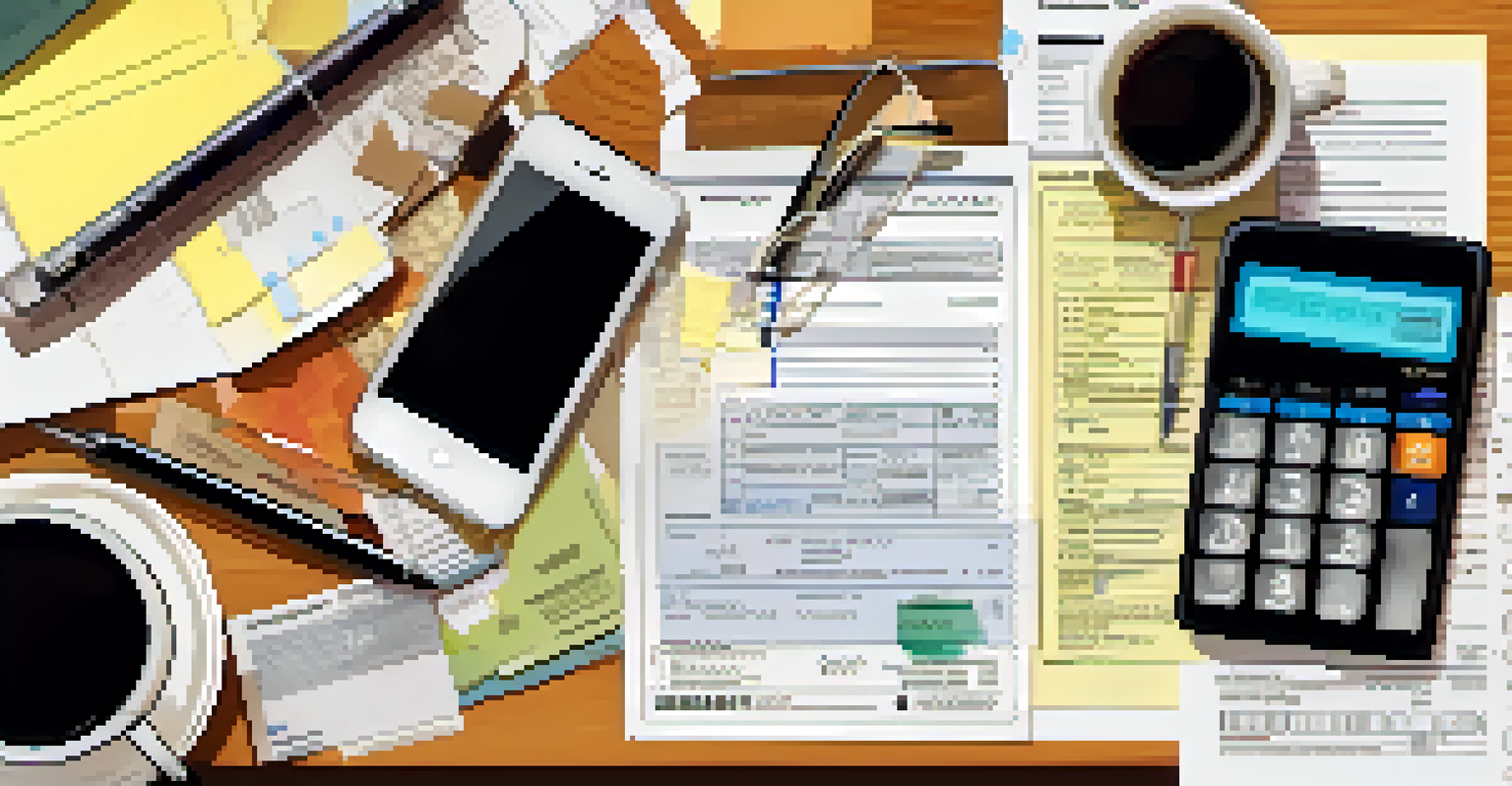The Importance of Keeping Accurate Records for Tax Purposes

Why Accurate Records Matter for Tax Time
Keeping accurate records is fundamental when it comes to tax season. It ensures that you can substantiate your income and deductions, which is crucial for compliance with tax regulations. Without solid documentation, you risk losing out on potential deductions or facing penalties for inaccuracies.
In this world, nothing can be said to be certain, except death and taxes.
Think of your records as the foundation of your tax return. Just like a sturdy house needs a strong foundation, your tax filings require reliable data. Accurate records not only protect you during audits but also provide peace of mind throughout the year.
Additionally, having well-organized records can save you time and stress when tax season rolls around. Instead of scrambling to find documentation, you’ll have everything at your fingertips, making the filing process smoother and more efficient.
Types of Records to Keep for Taxes
There are several types of records you should keep to ensure a comprehensive tax filing. These include income statements, receipts for expenses, bank statements, and documentation of any investments. Each piece of information plays a role in accurately reporting your financial situation to the IRS.

For example, if you're a freelancer, keeping records of client invoices and related expenses is vital. This not only helps you track your earnings but also allows you to claim deductions that can significantly lower your tax bill. Similarly, retaining receipts for business-related purchases can be crucial for substantiating those deductions.
Importance of Accurate Records
Accurate records are essential for substantiating income and deductions, ensuring compliance with tax regulations.
Moreover, consider digital options for record-keeping. Scanning documents and using cloud storage can help you maintain your records in an organized and accessible way, making it easier to find what you need when tax time arrives.
The Benefits of Organizing Your Tax Records
Organizing your tax records can lead to numerous benefits, the most immediate being reduced stress. When everything is in its place, you won't find yourself digging through piles of papers at the last minute. This organization can translate into a more accurate and timely tax return.
The hardest thing in the world to understand is the income tax.
On top of that, an organized system helps you identify potential deductions and credits you may have otherwise overlooked. For instance, maintaining a detailed log of mileage for business use can help you maximize your deductions, reducing your overall tax burden.
Finally, good record organization can be a lifesaver during an audit. If the IRS questions any part of your return, having everything neatly filed and easily accessible demonstrates your responsibility and diligence, potentially easing the audit process.
How Long Should You Keep Tax Records?
Knowing how long to keep your tax records is just as important as knowing which records to keep. Generally, the IRS recommends retaining records for at least three years from the date you file your return. This timeframe is essential in case of an audit or if you need to amend your tax return.
However, certain records, such as those related to property or investments, should be kept longer. For instance, if you sold a property, you’ll want to retain records for as long as you own that property, plus an additional three years after the sale to account for any potential tax implications.
Organize to Reduce Stress
Organizing tax records minimizes last-minute stress and helps you identify potential deductions.
Ultimately, it’s wise to err on the side of caution. If you’re unsure about a particular record's retention period, consider maintaining it for seven years. This can provide an added layer of protection and peace of mind.
The Risks of Inaccurate Record Keeping
Inaccurate record keeping can lead to a whole host of issues come tax time. The most obvious risk is the potential for an audit, which can be both time-consuming and stressful. If the IRS finds discrepancies in your records, they may question your entire return, leading to further investigation.
Moreover, inaccuracies can result in overpaying taxes or missing out on valuable deductions. For instance, if you mistakenly report higher income than you earned, you could end up paying more than necessary. Alternatively, failing to document deductible expenses can mean leaving money on the table.
Finally, the repercussions of poor record keeping can extend beyond just taxes. If you’re ever involved in a legal dispute or need to prove your financial standing, having unreliable records can complicate matters, leading to potential legal or financial consequences.
Using Technology for Record Keeping
In our digital age, technology can significantly streamline the process of record keeping. Using accounting software or apps can simplify tracking income and expenses, automating many of the tedious tasks associated with manual record keeping. This not only saves time but also reduces the likelihood of errors.
Additionally, many of these tools allow for easy categorization and organization of documents. For instance, you can upload receipts directly from your phone, ensuring that nothing gets lost in the shuffle. This real-time documentation can be a game changer when tax season approaches.
Consult a Tax Professional
Working with a tax professional provides tailored advice on record-keeping and maximizes your tax efficiency.
Moreover, cloud storage solutions enable you to access your records from anywhere, making it easy to find what you need when you need it. Whether you’re at home or on the go, having your financial information readily available can enhance your overall efficiency and peace of mind.
Consulting with a Tax Professional
While keeping accurate records is essential, consulting with a tax professional can provide additional insights and guidance. Tax experts can help you understand the nuances of tax laws and how they apply to your specific situation. They can also advise on record-keeping best practices tailored to your needs.
For instance, if you have complex investments or run a small business, a tax professional can assist in identifying which records are essential and how to maintain them properly. They can also provide strategies for maximizing deductions, which can have a significant impact on your overall tax liability.

Ultimately, working with a tax professional can offer peace of mind, ensuring that your records are not only accurate but also strategically beneficial. Investing in expert advice can pay dividends in the long run, especially when navigating the often confusing world of taxes.